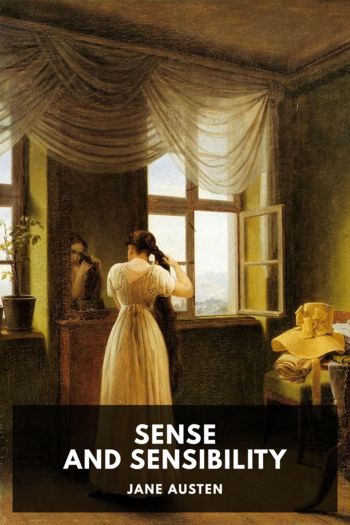Sense and Sensibility - Jane Austen (classic literature list txt) 📗

- Author: Jane Austen
Book online «Sense and Sensibility - Jane Austen (classic literature list txt) 📗». Author Jane Austen
“Did he come from your uncle’s, then, when he visited us?”
“Oh, yes; he had been staying a fortnight with us. Did you think he came directly from town?”
“No,” replied Elinor, most feelingly sensible of every fresh circumstance in favour of Lucy’s veracity; “I remember he told us, that he had been staying a fortnight with some friends near Plymouth.” She remembered too, her own surprise at the time, at his mentioning nothing farther of those friends, at his total silence with respect even to their names.
“Did not you think him sadly out of spirits?” repeated Lucy.
“We did, indeed, particularly so when he first arrived.”
“I begged him to exert himself for fear you should suspect what was the matter; but it made him so melancholy, not being able to stay more than a fortnight with us, and seeing me so much affected. Poor fellow! I am afraid it is just the same with him now; for he writes in wretched spirits. I heard from him just before I left Exeter;” taking a letter from her pocket and carelessly showing the direction to Elinor. “You know his hand, I dare say—a charming one it is; but that is not written so well as usual. He was tired, I dare say, for he had just filled the sheet to me as full as possible.”
Elinor saw that it was his hand, and she could doubt no longer. This picture, she had allowed herself to believe, might have been accidentally obtained; it might not have been Edward’s gift; but a correspondence between them by letter, could subsist only under a positive engagement, could be authorised by nothing else; for a few moments, she was almost overcome—her heart sunk within her, and she could hardly stand; but exertion was indispensably necessary; and she struggled so resolutely against the oppression of her feelings, that her success was speedy, and for the time complete.
“Writing to each other,” said Lucy, returning the letter into her pocket, “is the only comfort we have in such long separations. Yes, I have one other comfort in his picture, but poor Edward has not even that. If he had but my picture, he says he should be easy. I gave him a lock of my hair set in a ring when he was at Longstaple last, and that was some comfort to him, he said, but not equal to a picture. Perhaps you might notice the ring when you saw him?”
“I did,” said Elinor, with a composure of voice, under which was concealed an emotion and distress beyond anything she had ever felt before. She was mortified, shocked, confounded.
Fortunately for her, they had now reached the cottage, and the conversation could be continued no farther. After sitting with them a few minutes, the Miss Steeles returned to the Park, and Elinor was then at liberty to think and be wretched.
XXIIIHowever small Elinor’s general dependence on Lucy’s veracity might be, it was impossible for her on serious reflection to suspect it in the present case, where no temptation could be answerable to the folly of inventing a falsehood of such a description. What Lucy had asserted to be true, therefore, Elinor could not, dared not longer doubt; supported as it was too on every side by such probabilities and proofs, and contradicted by nothing but her own wishes. Their opportunity of acquaintance in the house of Mr. Pratt was a foundation for the rest, at once indisputable and alarming; and Edward’s visit near Plymouth, his melancholy state of mind, his dissatisfaction at his own prospects, his uncertain behaviour towards herself, the intimate knowledge of the Miss Steeles as to Norland and their family connections, which had often surprised her, the picture, the letter, the ring, formed altogether such a body of evidence, as overcame every fear of condemning him unfairly, and established as a fact, which no partiality could set aside, his ill-treatment of herself. Her resentment of such behaviour, her indignation at having been its dupe, for a short time made her feel only for herself; but other ideas, other considerations, soon arose. Had Edward been intentionally deceiving her? Had he feigned a regard for her which he did not feel? Was his engagement to Lucy an engagement of the heart? No; whatever it might once have been, she could not believe it such at present. His affection was all her own. She could not be deceived in that. Her mother, sisters, Fanny, all had been conscious of his regard for her at Norland; it was not an illusion of her own vanity. He certainly loved her. What a softener of the heart was this persuasion! How much could it not tempt her to forgive! He had been blamable, highly blamable, in remaining at Norland after he first felt her influence over him to be more than it ought to be. In that, he could not be defended; but if he had injured her, how much more had he injured himself; if her case were pitiable, his was hopeless. His imprudence had made her miserable for a while; but it seemed to have deprived himself of all chance of ever being otherwise. She might in time regain tranquillity; but he, what had he to look forward to? Could he ever be tolerably happy with Lucy Steele; could he, were his affection for herself out of the question, with his integrity, his delicacy, and well-informed mind, be satisfied with a wife like her—illiterate, artful, and selfish?
The youthful infatuation of nineteen would naturally blind him to everything but her beauty and good nature; but the four succeeding years—years, which if rationally spent, give such improvement to the understanding—must





Comments (0)